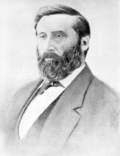October 27, 1870 | |||||||||||||||||
| |||||||||||||||||
 County results Jacob: 50–60% 60–70% 70–80% 80–90% Stevenson: 50–60% 60–70% 70–80% | |||||||||||||||||
| |||||||||||||||||
| Elections in West Virginia |
|---|
 |
The 1870 West Virginia gubernatorial election took place on October 27, 1870, to elect the governor of West Virginia.
This was the last election of a governor to a 2-year term. Starting in 1872, West Virginia would elect its governor to a 4-year term.

